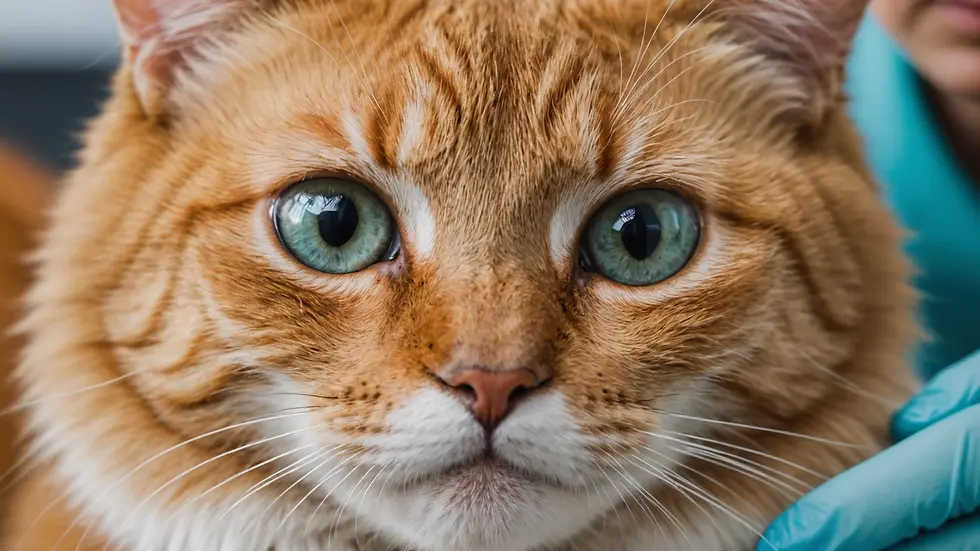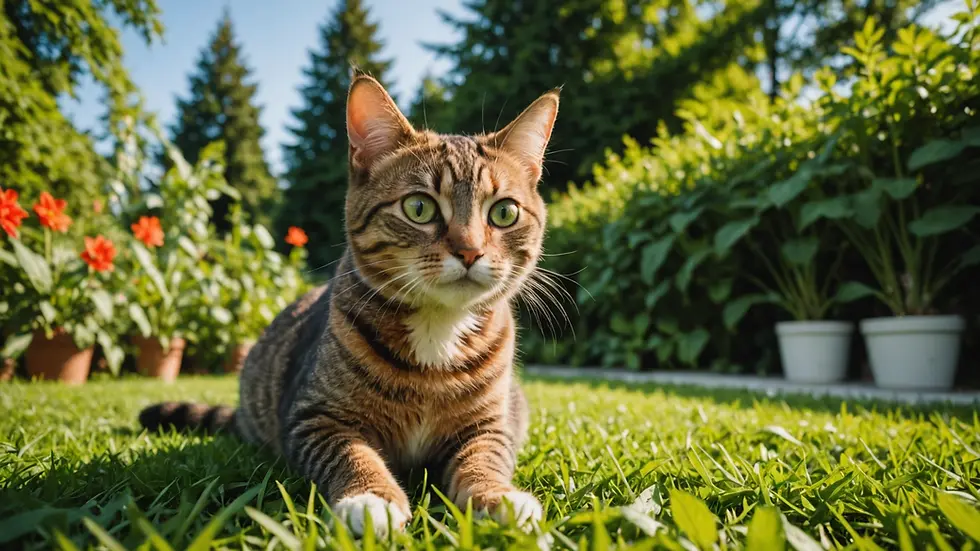Exploring the Importance of Vaccines for Cats in Different Living Environments
- Jyotiraj Borah
- Feb 6
- 4 min read
Vaccination is essential for keeping our feline friends healthy, and understanding their specific needs based on whether they live indoors or outdoors is crucial. Vaccines not only shield cats from serious diseases but also help to prevent outbreaks in the wider community. This guide will explore the critical vaccines necessary for indoor versus outdoor cats, emphasizing the unique risks and benefits that each environment presents.
Understanding the Need for Vaccination
Vaccination introduces a small, harmless part of a virus or bacterium into a cat's body. This process encourages the immune system to prepare defenses against future infections. By vaccinating our pets, we provide protection against diseases that can be exceedingly harmful or even fatal.
Outdoor cats face higher risks of exposure compared to their indoor counterparts. For instance, a study showed that outdoor cats are nearly 3 times more likely to contract diseases like feline leukemia due to interactions with other animals. Indoor cats can still be at risk if they have contact with other animals or contaminated surfaces; therefore, vaccination remains important for all cats.
Core Vaccines for All Cats
Core vaccinations are critical for every cat, regardless of their living situation. These vaccines include:
Feline Viral Rhinotracheitis (FVR)
FVR, caused by the feline herpesvirus, often leads to upper respiratory infections. Symptoms include sneezing and coughing. This virus is highly contagious; thus, indoor cats should receive this vaccine to minimize the risk.
Calicivirus (FCV)
Calicivirus can produce respiratory illness and painful mouth ulcers. It spreads easily in both active and confined environments. Almost 50% of cats with respiratory issues are found to have been infected by this virus, making vaccination a priority.
Feline Panleukopenia (FPV)
Often known as feline distemper, FPV can lead to severe gastrointestinal issues and is frequently fatal. Vaccination is critical, especially because the virus can survive on surfaces for months, posing risks even to indoor cats.
Rabies
Rabies is a severe viral illness that is nearly always fatal once symptoms appear. Vaccination for rabies is often a legal requirement in many regions. It is essential for all cats, as even indoor cats might encounter wildlife like bats.
Additional Vaccines for Outdoor Cats
Outdoor cats face unique risks that may necessitate additional vaccines. The most important include:
Feline Leukemia Virus (FeLV)
FeLV impacts the immune system and can result in life-threatening conditions, including cancer. Outdoor cats that roam freely have a significantly higher chance of contracting this virus, often through interactions with infected cats.
Feline Immunodeficiency Virus (FIV)
Similar to human HIV, FIV severely weakens a cat's immune system. This virus spreads primarily through bites—outdoor cats are more likely to be involved in fights, increasing their risk.
Bordetella Bronchiseptica
Commonly linked to kennel cough in dogs, Bordetella can also affect cats and cause respiratory issues. Outdoor cats, particularly those interacting with numerous animals, should be vaccinated against this.
Factors Influencing Vaccination Decisions
Several factors can influence a vaccination plan beyond just the living environment:
Age and Health Status
Kittens typically begin vaccinations around six to eight weeks old, requiring additional doses. Adult cats may need booster shots based on their previous vaccinations and overall health.
Lifestyle and Behavioral Patterns
A cat's exposure to other animals significantly affects its disease risk. For example, a supervised indoor cat allowed outside may require different vaccines than one that stays strictly indoors.
Geographic Location
Disease prevalence can differ by region. For instance, rabies cases occur more frequently in rural areas than urban centers. It's wise to consult with a veterinarian familiar with local risks to tailor your cat’s vaccination appropriately.
Veterinary Recommendations
Veterinarians play an essential role in creating vaccination schedules tailored to your cat's specific needs and health history. Regular visits ensure that your pet is receiving the relevant vaccines.

Vaccine Schedules: Indoor vs. Outdoor Cats
Establishing an appropriate vaccination schedule is key to ensuring every cat receives the necessary protection.
Indoor Cats
Indoor cats should receive core vaccines, typically administered in a series during the first few months. Boosters are generally given annually or every three years, depending on veterinary advice and vaccine type. Owners should consider any potential exposure risks, like visits to pet stores or boarding facilities.
Outdoor Cats
Outdoor cats often require the same core vaccines, but additional ones for FeLV, FIV, and Bordetella should also be included. Given their heightened risk, these vaccines may necessitate more frequent boosters tailored to their lifestyle.
Importance of Annual Check-ups
Regular veterinary check-ups are vital for maintaining your cat's health and ensuring vaccinations are up to date. During these visits, vets can evaluate the cat's overall well-being, discuss any changes in behavior, and suggest additional preventive measures or vaccines if needed.
Monitoring Vaccine Effectiveness
Not all vaccines remain effective over time. Titer testing, which measures immunity levels through blood tests, can help assess if your cat is adequately protected, particularly for older cats or those with health concerns.
Integrating Other Preventative Health Measures
Vaccination is one component of a well-rounded health plan. Additional measures include:
Parasite Control
Outdoor cats are more prone to parasites like fleas and ticks. Establishing an effective control program is crucial to their health.
Nutrition and Diet
A healthy diet is vital for a strong immune system. Ensuring your cat receives proper nutrition, tailored to their needs, enhances their overall wellness.
Spaying and Neutering
Beyond controlling the cat population, spaying and neutering can prevent numerous health issues, including certain reproductive cancers and infections, leading to longer, healthier lives.
Safeguarding Your Feline Friend
Vaccination forms the foundation of effective feline health care and varies significantly based on a cat's living environment. While all cats need core vaccines, outdoor cats face additional threats that make a more comprehensive vaccination plan essential.
Being informed about the necessary vaccinations and their significance empowers cat owners to make wise choices for their pets. Combine regular vet check-ups with tailored vaccination plans and preventive health measures to ensure the well-being of your furry companions.


Always consult your veterinarian to develop the most suitable vaccination plan for your cat based on their lifestyle and environment.




Comments